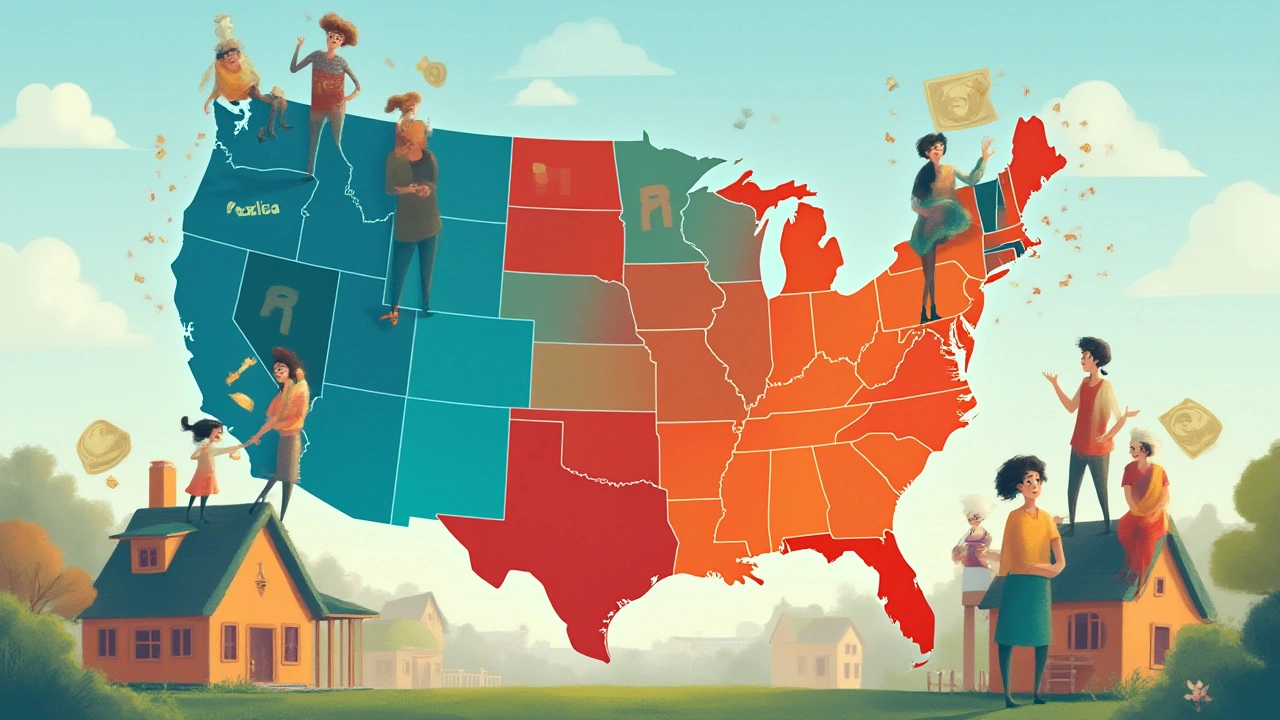Ever heard someone complain that their property tax bill is sky-high? They probably live in New Jersey. The moment you compare property tax bills across different states, the differences are straight-up jaw-dropping. Two families can have houses worth the same—but hundreds of miles apart—and one ends up paying more in yearly tax than the other forked over at closing. If you’ve ever wondered why moving across a state line can feel like hitting the reset button on your mortgage payments, it’s all about property taxes. The truth is, where you live can change your tax picture by thousands of dollars each year, and few people see that coming until they move. Let’s dig into which states charge the most, how it all works, and what you can do if you’re on the wrong side of the tax map.
Where Property Taxes Hit the Hardest
So, who’s really topping the charts? The title for highest property taxes in America almost always goes to New Jersey, and the numbers back it up. The average effective property tax rate there hovers around 2.21%—which might sound tame, but on a $400,000 house, you’re staring at nearly $9,000 per year. Ouch. Illinois and Connecticut are right behind. Illinois’s rate averages approximately 2.18%. Even when you scroll down the rankings, you’ll find states like New Hampshire, Vermont, and Wisconsin—all solidly above the 1.7% mark. It means property taxes in these states can turn homeownership into an expensive habit.
On the other hand, if you cross over to Hawaii, Alabama, or Colorado, you get something like a tax vacation. Hawaii, for example, asks for just 0.32% (yes, seriously) on average, making a home there look even sunnier. This isn’t just about numbers—it reflects a state’s budget priorities, how schools are funded, and whether local government leans on owners for its cash. Most local services, from fire stations to street repair, police to public libraries, get their budgets from property taxes—so where the state spends more, property owners feel it. And that’s why New Jersey, for example, famously funds schools at sky-high levels and has tight zoning. The price? Homeowners pay the tab.
What Makes Property Taxes So Different?
It’s not just random. Your property tax rate depends on a recipe unique to each region. The process starts with the value of your home—determined by local tax assessors, sometimes hotly debated. Multiply that by the local property tax rate, and boom, there’s your bill. But counties and towns pile on their own rates, so the same $200,000 home in two zip codes can mean wildly different taxes.
Take Texas for example. You might imagine it’s a tax-free haven, since they don’t nibble from your paycheck with income tax. But Texas makes up for it: the average property tax rate is about 1.80%. Move to a Houston suburb, that number can jump. Same goes for New York, where certain counties like Westchester demand a lot more than you’d expect. Each state has its own formula for deciding what “market value” even means, and many places adjust rates every year to fund schools or fix budget holes.
This patchwork leads to surprises. My friend Neela and I once nearly bought a lovely colonial just across the border in upstate New York—until we saw the property tax bill was almost as much as our planned mortgage. No exaggeration. The deal-breaker? The difference from the next county over was almost $5,000 a year for homes just a few streets apart. It all boils down to how local governments balance their budgets, and those priorities shift over time. States also toss in credits and exemptions that can reduce, or sometimes barely dent, the bill for longtime residents or seniors.

Which Homes and Owners Get Hit Hardest?
Single-family homes often take the brunt, especially in areas with few big businesses to carry the tax load. If a town’s got more cute cottages than corporate headquarters, local leaders turn to homeowners for taxes. And if your area is booming and prices keep rising, the assessor recalculates, meaning bigger bills each year. That’s been a trend for a while, especially in hot housing markets like California, Texas, and Florida, even though their rates are lower than the Northeastern states.
New homeowners feel the sting most, since many tax credits and exemptions phase in only after you’ve been in your house for years. Seniors can get some relief, and some states offer “homestead exemptions” to shield part of your place from taxes—but not everywhere. The quirkiest twist? There are places where your taxes can literally double if you rebuild after a catastrophe or upgrade your kitchen—assessors see improvements as new taxable value, and suddenly your old tax number is out the window.
Many states (take California’s Prop 13 as a big example) “lock in” your home’s taxable value while you own it, so long-timers pay much less than recent buyers, even if the homes are nearly identical. That’s why you sometimes hear about neighbors side-eyeing each other: imagine paying $2,000 more than the guy across the street for the same square footage, just because you moved in later!
Tactics for Surviving High Property Taxes
If you’re stuck in a high-tax zone, you’ve got a few options. First step: make sure your house isn’t over-assessed. Check those yearly tax statements—if the county thinks your house is worth a fortune, but you know you’d never sell it for that much, you can appeal. Many owners don’t realize it, but you can challenge property valuations. Arm yourself with sales prices for similar houses in your neighborhood, fill out the paperwork, and sometimes you can swipe hundreds—even thousands—off your bill.
Next up, look at exemptions. Almost every state offers some relief for seniors, vets, and sometimes, for primary residences (homestead exemptions). Don’t leave that money on the table. It’s amazing how many people simply pay what the tax office sends and never ask for discounts they legitimately deserve.
If you can’t shrink your bill, consider shifting your spending. Tweak your budget to cover the cost, knowing your taxes are doing real work in the community—from schools to pothole repairs. Some homeowners opt for a smaller house, or move to a neighboring town with better rates but the same amenities. Your realtor should always know the tax rates in an area before showing you a property—never be afraid to ask. And if you’re planning a remodel, talk to your assessor about which projects could spike your taxes. Sometimes painting the front door is tax harmless, but finishing the basement triggers a reassessment. Little things add up fast.

Why High Property Taxes Might Be Worth It
Here’s a twist: some of the highest-taxed states also rank best for public services. Schools in New Jersey frequently land near the top in national rankings, and cities with high property taxes tend to have well-funded police and fire departments, parks, and libraries. Sure, nobody loves writing big checks, but lots of folks end up sticking around for the community benefits.
You can spot a pattern. Communities with top-notch schools, better crime rates, and higher quality local infrastructure? Almost always, they sit in states with higher average property taxes. So sometimes, that stinging tax bill is buying you a better daily life—even if it makes you wince. But the payoff isn’t always immediate, so if you’re relocating, ask yourself what matters to you most. Do you want lower bills, or are you willing to pay up for top schools and better parks? My neighbor told me he moved from Florida to New Hampshire, got hit with higher taxes, but has zero regrets: his kids are thriving in school, and the neighborhood’s buzzing with community events.
If you’re hunting for a solid answer, New Jersey grabs the top spot for the highest property taxes in the US. But whether that’s a deal-breaker or not depends on what you want from where you live. Either way, knowing how the property tax game works sets you up to play smarter—no matter where you call home.
